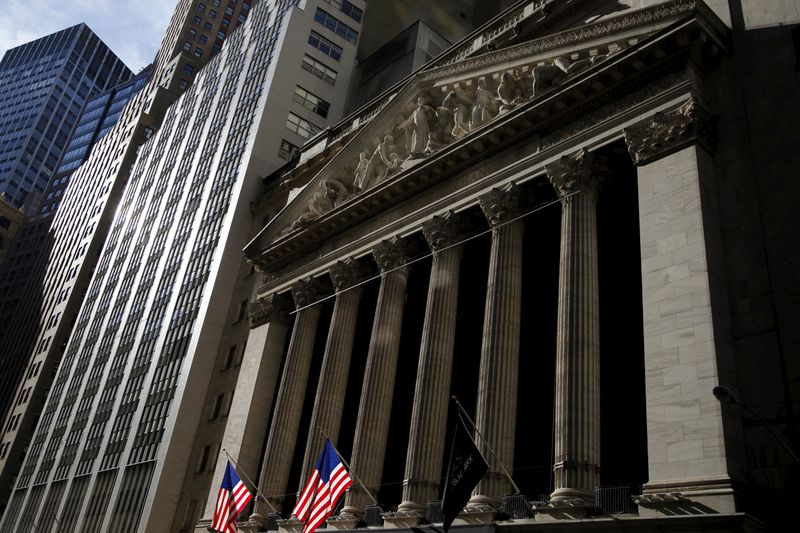A look at the day ahead in U.S. and global markets from Mike Dolan
World markets struggled to find a footing on Wednesday after Europe's ASML (AS:ASML) sideswiped the global chip sector late yesterday with a surprisingly weak orders outlook and investors prayed the flub was a one-off as third-quarter earnings updates stream in.
There was better news for bond markets - with yields declining on a mix of falling oil prices and significant European disinflation that underscores expectations of another European Central Bank interest rate cut on Thursday.
And that picture was replicated in Britain on Wednesday, with headline inflation dropping much further below the Bank of England's 2% target than markets had bet on - upping bets on a BOE rate cut next month and knocking the pound back to its lowest in almost two months.
With European fixed income markets rallying again, U.S. Treasury yields also fell back close to 4% and Federal Reserve futures are back fully pricing a quarter point U.S. rate cut on Nov. 7.
But much of the heat and price action was in stocks.
While banks and pharma firms dominate Wednesday's diary, reverberations from ASML's big miss knocked Wall Street back from record highs on Tuesday, adding to a swoon in energy stocks from falling oil prices and throwing a spotlight on Thursday's update from Taiwan's chip behemoth TSMC.
The read across to AI-darling Nvidia (NASDAQ:NVDA) saw its shares recoil almost 5% from Monday's new record, with a small recovery pencilled in ahead of today's bell.
However ASML itself, the world's biggest chipmaking equipment manufacturer, shed another 4% in Europe on Wednesday, adding to the 16% loss on Tuesday - its steepest one-day decline in four years.
And in a bad week for European stocks more generally, the luxury sector remained under the cosh as France's LVMH dropped 7% due a fall in third-quarter sales hit by waning customer confidence in China.
China's struggling economy, U.S. investment curbs on its technology sector and a brewing tariff trade war between Beijing and Brussels tie all these stories together.
And despite slightly frantic Chinese stimulus measures in recent weeks to lift the flagging economy, the initial stocks boost from that is fading fast. China's mainland index and Hong Kong's Hang Seng ended in the red again on Wednesday - both more than 10% off post-stimulus highs.
Beijing will hold a press conference on Thursday to discuss promoting the "steady and healthy" development of the property sector, the State Council Information Office said, although that's failed to reignite much market excitement.
And indeed China's troubles, along with scaled back global oil demand forecasts for 2025, are one of the reasons crude prices are sliding yet.
Crude tumbled more than 4% to a near two-week low on Tuesday due to that weaker outlook and after a media report said Israel would not strike Iranian nuclear and oil sites, easing fears of supply disruptions.
While U.S. oil prices tried to retain a toehold on $70 per barrel on Wednesday, they continue to track year-on-year losses of close to 20% and remain a powerful force depressing headline annual inflation rates.
Back on Wall St, the chip sector wobble cut across better news from the banks.
Bank of America shares rose 0.5% following a third-quarter profit beat, while Charles Schwab (NYSE:SCHW) shares climbed 6% after exceeding estimates.
Citigroup, however, fell 5% after it reported mixed results with net income declining and net interest income weaker than expected while debt underwriting propped up its investment banking results.
Morgan Stanley and some of the small regional banks are up next on Wednesday.
Wall St futures more broadly are slightly higher before the open.
Aided in part by sterling's slide, the dollar index nudged to its best levels since early August.
As the U.S. election campaign enters its final phase, betting markets put Republican Donald Trump as the slight favorite to return to the White House despite opinion polls showed a tight race between him and Democrat rival Kamala Harris.
Trump on Tuesday defended his protectionist trade policies and other fiscal proposals in an interview with Bloomberg, dismissing suggestions that they could drive up the federal debt.
And he appeared to back away from previous comments that as president, he should be able to exert control over the Fed interest rate decisions.
"I think I have the right to say I think you should go up or down a little bit," Trump said, referring to setting interest rates. "I don't think I should be allowed to order it, but I think I have the right to put in comments as to whether or not the interest rates should go up or down."
How Trump plans to weaken the dollar, however, remains a bit of mystery beyond his well-flagged tariff plans.
Key developments that should provide more direction to U.S. markets later on Wednesday:
* US corporate earnings: Morgan Stanley, US Bancorp (NYSE:USB), Citizens Financial (NYSE:CFG), Discover Financial, Equifax (NYSE:EFX), Synchrony, Prologis (NYSE:PLD), Abbott Laboratories (NYSE:ABT), CSX (NASDAQ:CSX), PPG, Kinder Morgan (NYSE:KMI), Steel Dynamics (NASDAQ:STLD), Crown Castle (NYSE:CCI)

* US September import/export prices
* European Central Bank President Christine Lagarde speaks